University Emotional Intelligence: Self-Assessment Reflective Essay
VerifiedAdded on 2022/10/08
|7
|1717
|56
Essay
AI Summary
This essay presents a self-assessment of emotional intelligence, utilizing the Global Leadership Foundation's Global Emotional Intelligence Test (GEIT) and Daniel Goleman's EQ test. The student analyzes the results of these tests, comparing them with assessments from peers, to understand their strengths and weaknesses in areas such as self-awareness, social awareness, self-management, and relationship management. The Johari Window model is applied to interpret the findings, highlighting the 'Open,' 'Hidden,' and other quadrants of self-perception. The essay further evaluates the student's competencies within the context of a globalized workplace, emphasizing the need for empathetic communication and relationship-building skills, particularly in a human resource management role. The student concludes by identifying areas for skill development to enhance their effectiveness in a diverse and dynamic work environment, recognizing the importance of understanding the psychological requirements of individuals.
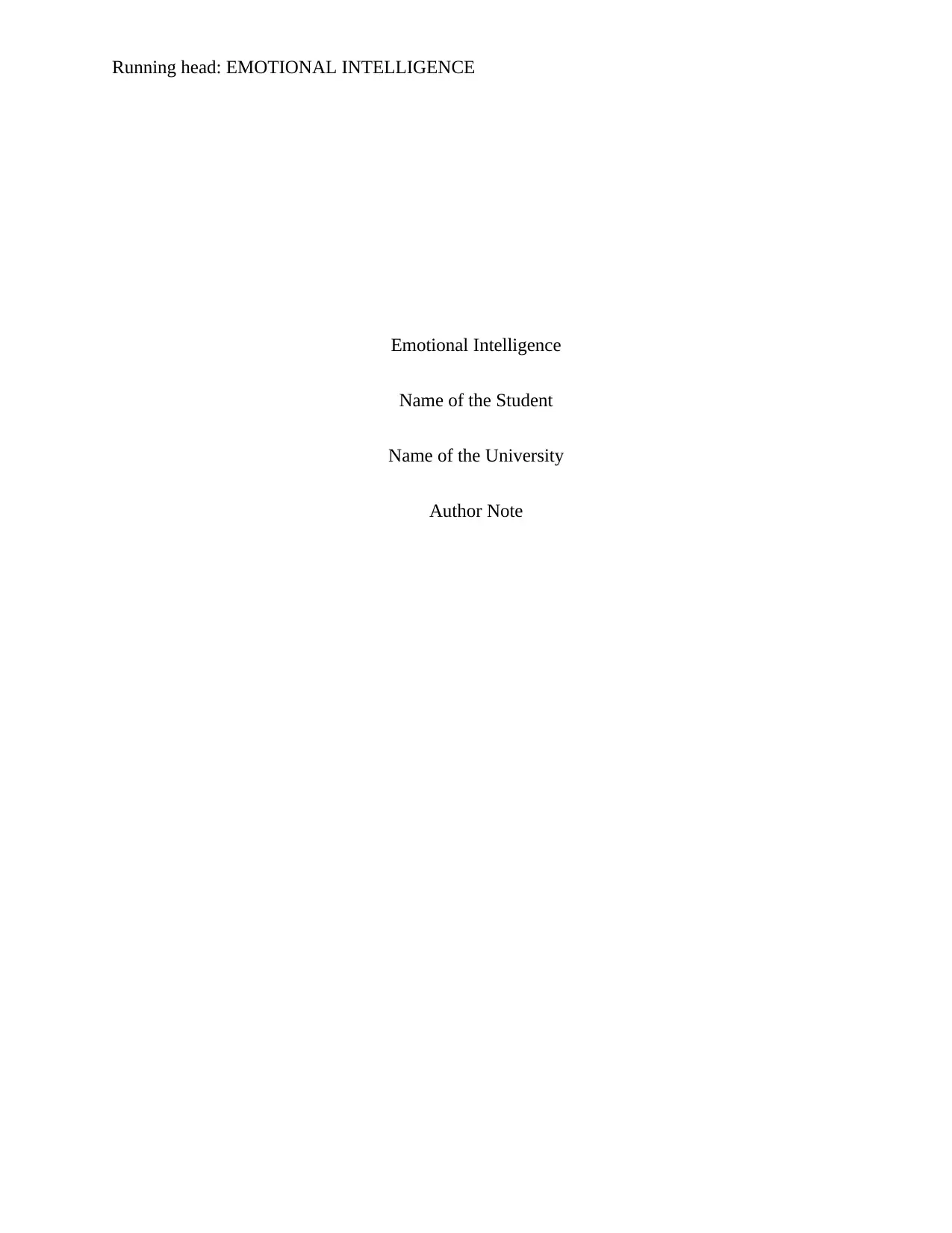
Running head: EMOTIONAL INTELLIGENCE
Emotional Intelligence
Name of the Student
Name of the University
Author Note
Emotional Intelligence
Name of the Student
Name of the University
Author Note
Paraphrase This Document
Need a fresh take? Get an instant paraphrase of this document with our AI Paraphraser
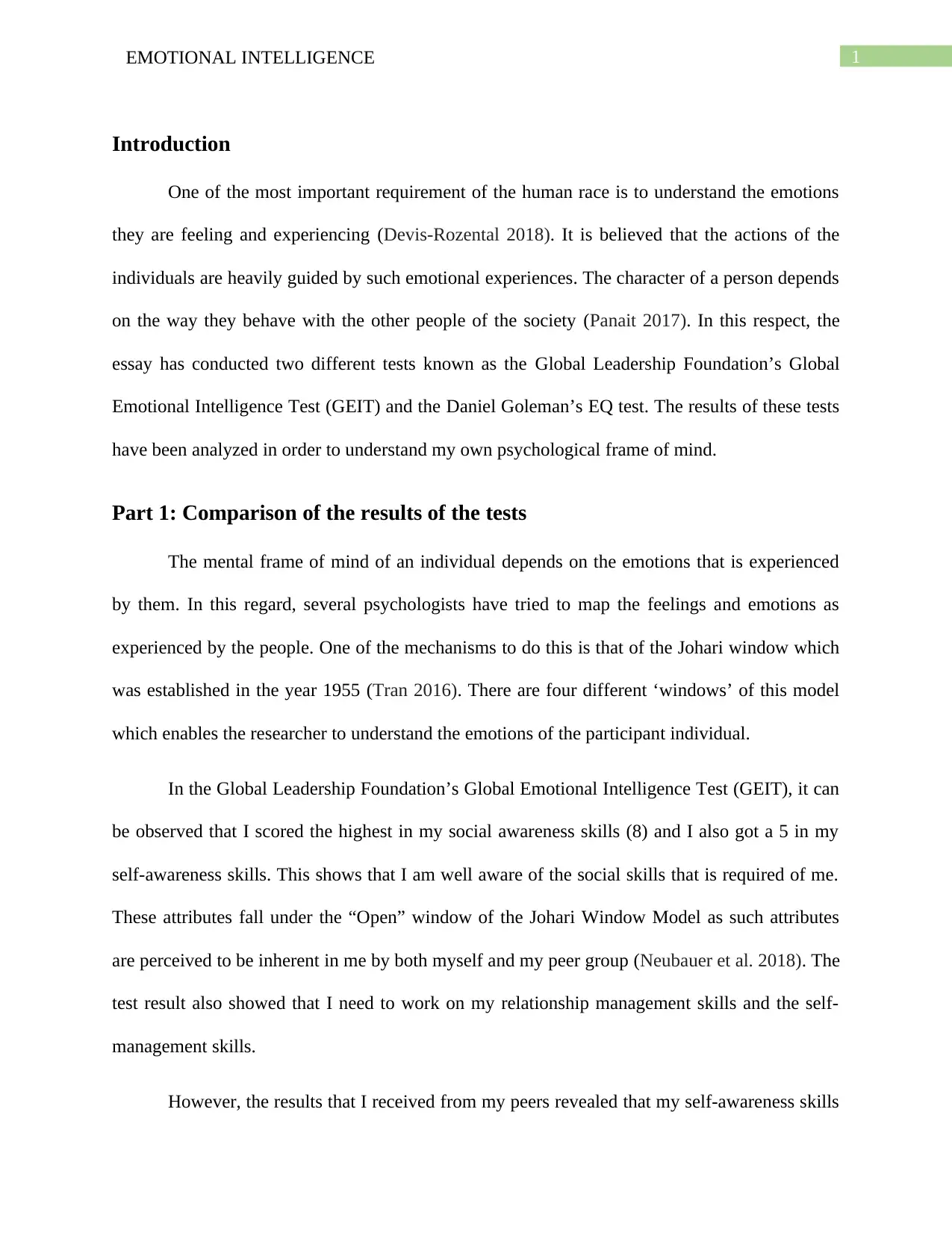
1EMOTIONAL INTELLIGENCE
Introduction
One of the most important requirement of the human race is to understand the emotions
they are feeling and experiencing (Devis-Rozental 2018). It is believed that the actions of the
individuals are heavily guided by such emotional experiences. The character of a person depends
on the way they behave with the other people of the society (Panait 2017). In this respect, the
essay has conducted two different tests known as the Global Leadership Foundation’s Global
Emotional Intelligence Test (GEIT) and the Daniel Goleman’s EQ test. The results of these tests
have been analyzed in order to understand my own psychological frame of mind.
Part 1: Comparison of the results of the tests
The mental frame of mind of an individual depends on the emotions that is experienced
by them. In this regard, several psychologists have tried to map the feelings and emotions as
experienced by the people. One of the mechanisms to do this is that of the Johari window which
was established in the year 1955 (Tran 2016). There are four different ‘windows’ of this model
which enables the researcher to understand the emotions of the participant individual.
In the Global Leadership Foundation’s Global Emotional Intelligence Test (GEIT), it can
be observed that I scored the highest in my social awareness skills (8) and I also got a 5 in my
self-awareness skills. This shows that I am well aware of the social skills that is required of me.
These attributes fall under the “Open” window of the Johari Window Model as such attributes
are perceived to be inherent in me by both myself and my peer group (Neubauer et al. 2018). The
test result also showed that I need to work on my relationship management skills and the self-
management skills.
However, the results that I received from my peers revealed that my self-awareness skills
Introduction
One of the most important requirement of the human race is to understand the emotions
they are feeling and experiencing (Devis-Rozental 2018). It is believed that the actions of the
individuals are heavily guided by such emotional experiences. The character of a person depends
on the way they behave with the other people of the society (Panait 2017). In this respect, the
essay has conducted two different tests known as the Global Leadership Foundation’s Global
Emotional Intelligence Test (GEIT) and the Daniel Goleman’s EQ test. The results of these tests
have been analyzed in order to understand my own psychological frame of mind.
Part 1: Comparison of the results of the tests
The mental frame of mind of an individual depends on the emotions that is experienced
by them. In this regard, several psychologists have tried to map the feelings and emotions as
experienced by the people. One of the mechanisms to do this is that of the Johari window which
was established in the year 1955 (Tran 2016). There are four different ‘windows’ of this model
which enables the researcher to understand the emotions of the participant individual.
In the Global Leadership Foundation’s Global Emotional Intelligence Test (GEIT), it can
be observed that I scored the highest in my social awareness skills (8) and I also got a 5 in my
self-awareness skills. This shows that I am well aware of the social skills that is required of me.
These attributes fall under the “Open” window of the Johari Window Model as such attributes
are perceived to be inherent in me by both myself and my peer group (Neubauer et al. 2018). The
test result also showed that I need to work on my relationship management skills and the self-
management skills.
However, the results that I received from my peers revealed that my self-awareness skills
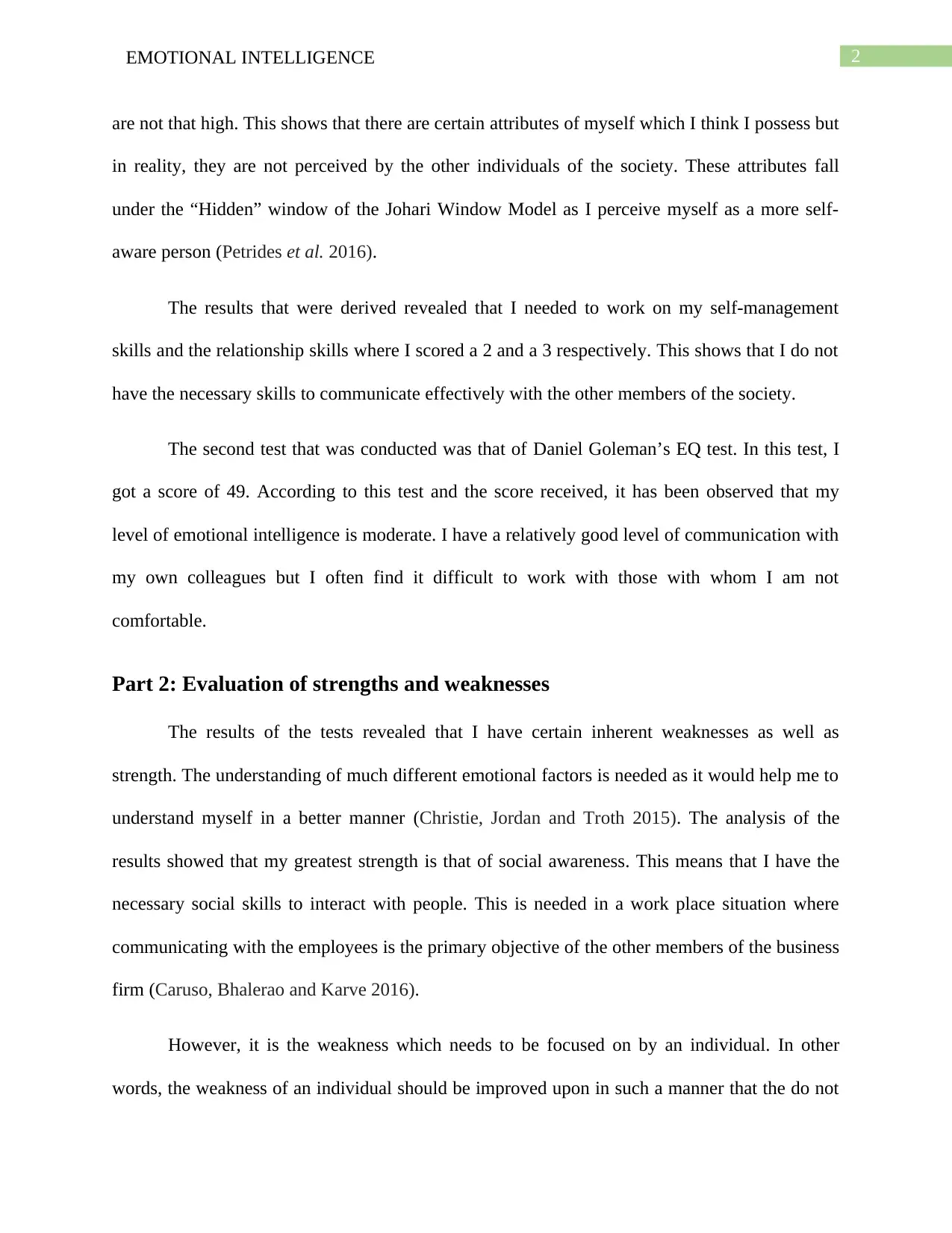
2EMOTIONAL INTELLIGENCE
are not that high. This shows that there are certain attributes of myself which I think I possess but
in reality, they are not perceived by the other individuals of the society. These attributes fall
under the “Hidden” window of the Johari Window Model as I perceive myself as a more self-
aware person (Petrides et al. 2016).
The results that were derived revealed that I needed to work on my self-management
skills and the relationship skills where I scored a 2 and a 3 respectively. This shows that I do not
have the necessary skills to communicate effectively with the other members of the society.
The second test that was conducted was that of Daniel Goleman’s EQ test. In this test, I
got a score of 49. According to this test and the score received, it has been observed that my
level of emotional intelligence is moderate. I have a relatively good level of communication with
my own colleagues but I often find it difficult to work with those with whom I am not
comfortable.
Part 2: Evaluation of strengths and weaknesses
The results of the tests revealed that I have certain inherent weaknesses as well as
strength. The understanding of much different emotional factors is needed as it would help me to
understand myself in a better manner (Christie, Jordan and Troth 2015). The analysis of the
results showed that my greatest strength is that of social awareness. This means that I have the
necessary social skills to interact with people. This is needed in a work place situation where
communicating with the employees is the primary objective of the other members of the business
firm (Caruso, Bhalerao and Karve 2016).
However, it is the weakness which needs to be focused on by an individual. In other
words, the weakness of an individual should be improved upon in such a manner that the do not
are not that high. This shows that there are certain attributes of myself which I think I possess but
in reality, they are not perceived by the other individuals of the society. These attributes fall
under the “Hidden” window of the Johari Window Model as I perceive myself as a more self-
aware person (Petrides et al. 2016).
The results that were derived revealed that I needed to work on my self-management
skills and the relationship skills where I scored a 2 and a 3 respectively. This shows that I do not
have the necessary skills to communicate effectively with the other members of the society.
The second test that was conducted was that of Daniel Goleman’s EQ test. In this test, I
got a score of 49. According to this test and the score received, it has been observed that my
level of emotional intelligence is moderate. I have a relatively good level of communication with
my own colleagues but I often find it difficult to work with those with whom I am not
comfortable.
Part 2: Evaluation of strengths and weaknesses
The results of the tests revealed that I have certain inherent weaknesses as well as
strength. The understanding of much different emotional factors is needed as it would help me to
understand myself in a better manner (Christie, Jordan and Troth 2015). The analysis of the
results showed that my greatest strength is that of social awareness. This means that I have the
necessary social skills to interact with people. This is needed in a work place situation where
communicating with the employees is the primary objective of the other members of the business
firm (Caruso, Bhalerao and Karve 2016).
However, it is the weakness which needs to be focused on by an individual. In other
words, the weakness of an individual should be improved upon in such a manner that the do not
⊘ This is a preview!⊘
Do you want full access?
Subscribe today to unlock all pages.

Trusted by 1+ million students worldwide
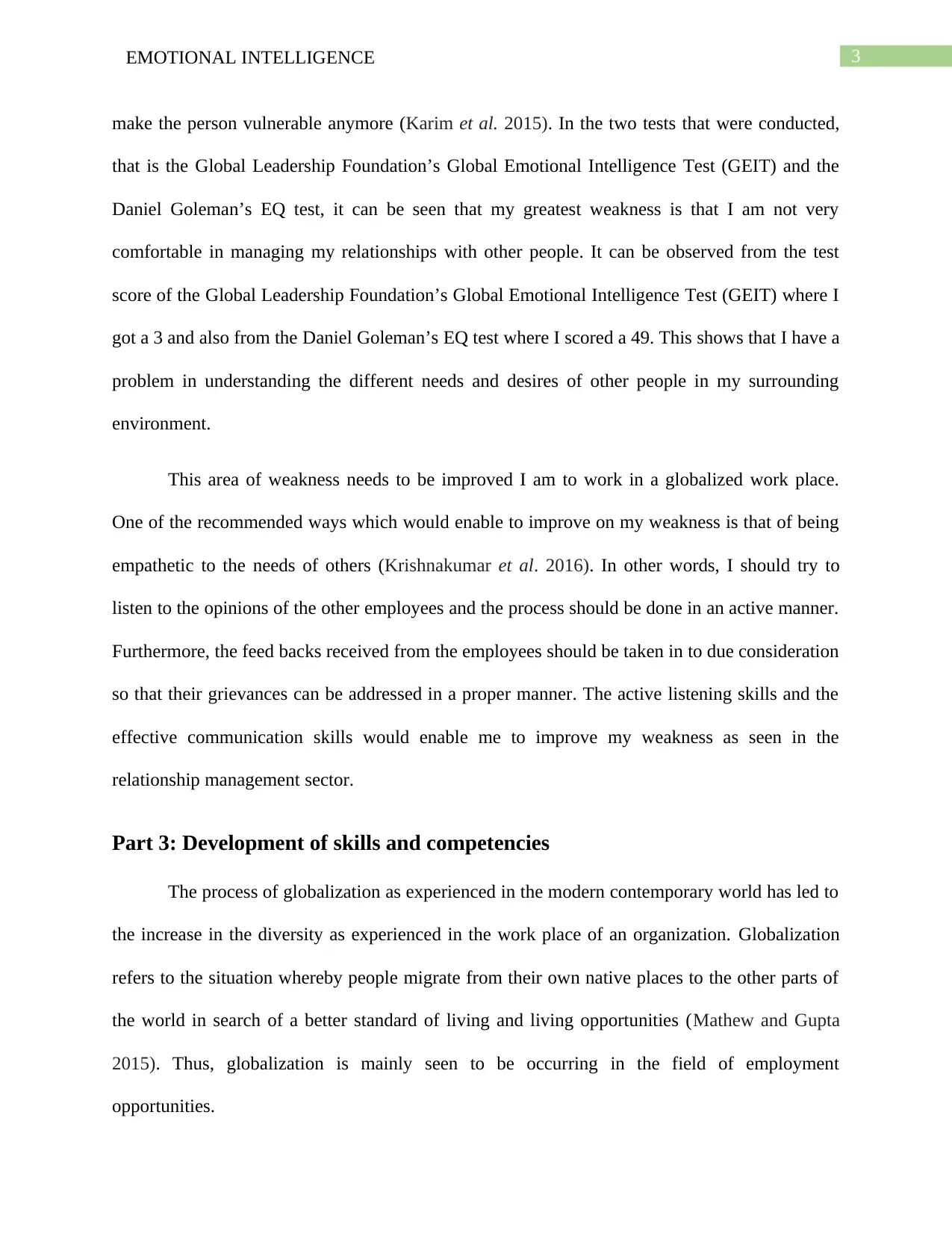
3EMOTIONAL INTELLIGENCE
make the person vulnerable anymore (Karim et al. 2015). In the two tests that were conducted,
that is the Global Leadership Foundation’s Global Emotional Intelligence Test (GEIT) and the
Daniel Goleman’s EQ test, it can be seen that my greatest weakness is that I am not very
comfortable in managing my relationships with other people. It can be observed from the test
score of the Global Leadership Foundation’s Global Emotional Intelligence Test (GEIT) where I
got a 3 and also from the Daniel Goleman’s EQ test where I scored a 49. This shows that I have a
problem in understanding the different needs and desires of other people in my surrounding
environment.
This area of weakness needs to be improved I am to work in a globalized work place.
One of the recommended ways which would enable to improve on my weakness is that of being
empathetic to the needs of others (Krishnakumar et al. 2016). In other words, I should try to
listen to the opinions of the other employees and the process should be done in an active manner.
Furthermore, the feed backs received from the employees should be taken in to due consideration
so that their grievances can be addressed in a proper manner. The active listening skills and the
effective communication skills would enable me to improve my weakness as seen in the
relationship management sector.
Part 3: Development of skills and competencies
The process of globalization as experienced in the modern contemporary world has led to
the increase in the diversity as experienced in the work place of an organization. Globalization
refers to the situation whereby people migrate from their own native places to the other parts of
the world in search of a better standard of living and living opportunities (Mathew and Gupta
2015). Thus, globalization is mainly seen to be occurring in the field of employment
opportunities.
make the person vulnerable anymore (Karim et al. 2015). In the two tests that were conducted,
that is the Global Leadership Foundation’s Global Emotional Intelligence Test (GEIT) and the
Daniel Goleman’s EQ test, it can be seen that my greatest weakness is that I am not very
comfortable in managing my relationships with other people. It can be observed from the test
score of the Global Leadership Foundation’s Global Emotional Intelligence Test (GEIT) where I
got a 3 and also from the Daniel Goleman’s EQ test where I scored a 49. This shows that I have a
problem in understanding the different needs and desires of other people in my surrounding
environment.
This area of weakness needs to be improved I am to work in a globalized work place.
One of the recommended ways which would enable to improve on my weakness is that of being
empathetic to the needs of others (Krishnakumar et al. 2016). In other words, I should try to
listen to the opinions of the other employees and the process should be done in an active manner.
Furthermore, the feed backs received from the employees should be taken in to due consideration
so that their grievances can be addressed in a proper manner. The active listening skills and the
effective communication skills would enable me to improve my weakness as seen in the
relationship management sector.
Part 3: Development of skills and competencies
The process of globalization as experienced in the modern contemporary world has led to
the increase in the diversity as experienced in the work place of an organization. Globalization
refers to the situation whereby people migrate from their own native places to the other parts of
the world in search of a better standard of living and living opportunities (Mathew and Gupta
2015). Thus, globalization is mainly seen to be occurring in the field of employment
opportunities.
Paraphrase This Document
Need a fresh take? Get an instant paraphrase of this document with our AI Paraphraser
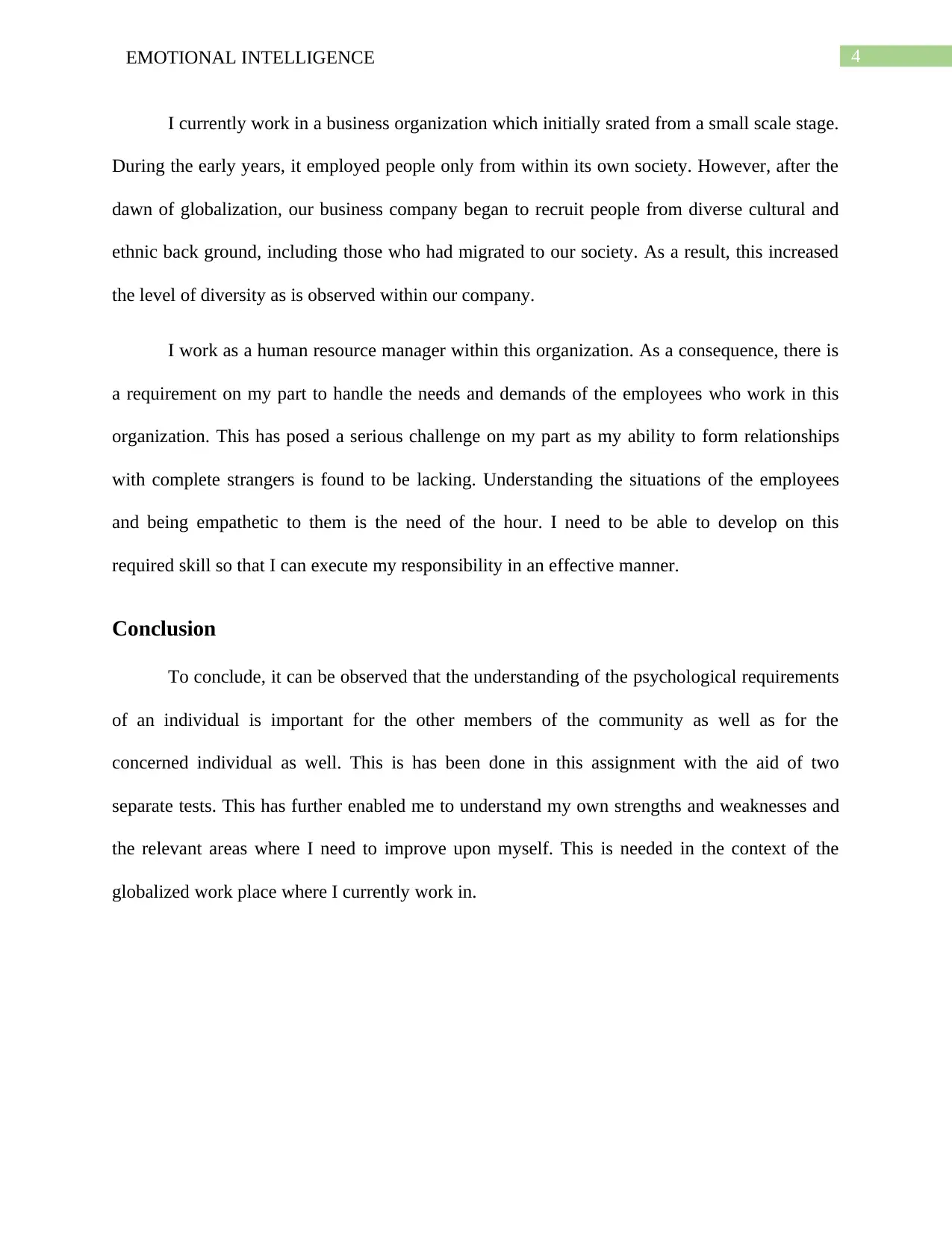
4EMOTIONAL INTELLIGENCE
I currently work in a business organization which initially srated from a small scale stage.
During the early years, it employed people only from within its own society. However, after the
dawn of globalization, our business company began to recruit people from diverse cultural and
ethnic back ground, including those who had migrated to our society. As a result, this increased
the level of diversity as is observed within our company.
I work as a human resource manager within this organization. As a consequence, there is
a requirement on my part to handle the needs and demands of the employees who work in this
organization. This has posed a serious challenge on my part as my ability to form relationships
with complete strangers is found to be lacking. Understanding the situations of the employees
and being empathetic to them is the need of the hour. I need to be able to develop on this
required skill so that I can execute my responsibility in an effective manner.
Conclusion
To conclude, it can be observed that the understanding of the psychological requirements
of an individual is important for the other members of the community as well as for the
concerned individual as well. This is has been done in this assignment with the aid of two
separate tests. This has further enabled me to understand my own strengths and weaknesses and
the relevant areas where I need to improve upon myself. This is needed in the context of the
globalized work place where I currently work in.
I currently work in a business organization which initially srated from a small scale stage.
During the early years, it employed people only from within its own society. However, after the
dawn of globalization, our business company began to recruit people from diverse cultural and
ethnic back ground, including those who had migrated to our society. As a result, this increased
the level of diversity as is observed within our company.
I work as a human resource manager within this organization. As a consequence, there is
a requirement on my part to handle the needs and demands of the employees who work in this
organization. This has posed a serious challenge on my part as my ability to form relationships
with complete strangers is found to be lacking. Understanding the situations of the employees
and being empathetic to them is the need of the hour. I need to be able to develop on this
required skill so that I can execute my responsibility in an effective manner.
Conclusion
To conclude, it can be observed that the understanding of the psychological requirements
of an individual is important for the other members of the community as well as for the
concerned individual as well. This is has been done in this assignment with the aid of two
separate tests. This has further enabled me to understand my own strengths and weaknesses and
the relevant areas where I need to improve upon myself. This is needed in the context of the
globalized work place where I currently work in.
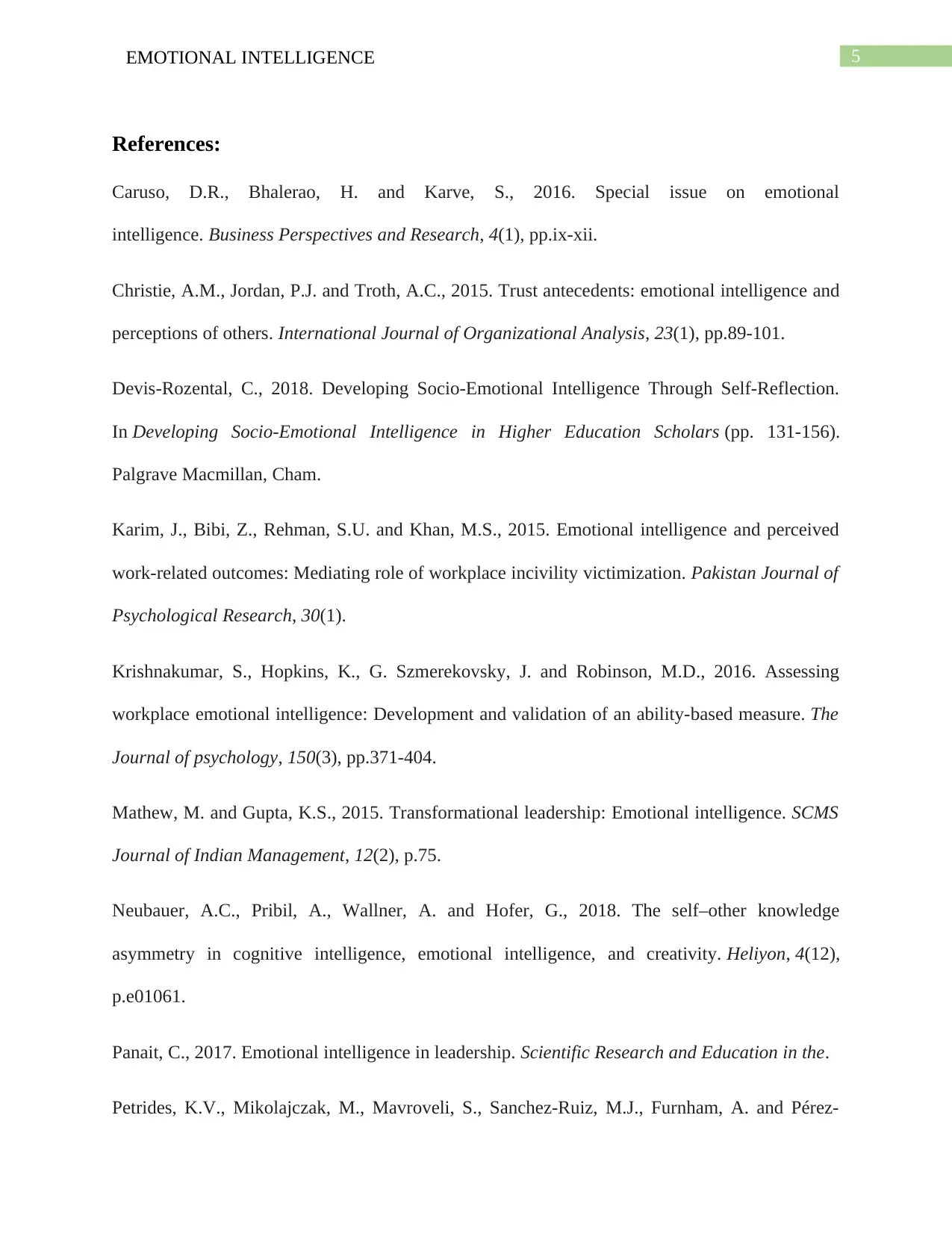
5EMOTIONAL INTELLIGENCE
References:
Caruso, D.R., Bhalerao, H. and Karve, S., 2016. Special issue on emotional
intelligence. Business Perspectives and Research, 4(1), pp.ix-xii.
Christie, A.M., Jordan, P.J. and Troth, A.C., 2015. Trust antecedents: emotional intelligence and
perceptions of others. International Journal of Organizational Analysis, 23(1), pp.89-101.
Devis-Rozental, C., 2018. Developing Socio-Emotional Intelligence Through Self-Reflection.
In Developing Socio-Emotional Intelligence in Higher Education Scholars (pp. 131-156).
Palgrave Macmillan, Cham.
Karim, J., Bibi, Z., Rehman, S.U. and Khan, M.S., 2015. Emotional intelligence and perceived
work-related outcomes: Mediating role of workplace incivility victimization. Pakistan Journal of
Psychological Research, 30(1).
Krishnakumar, S., Hopkins, K., G. Szmerekovsky, J. and Robinson, M.D., 2016. Assessing
workplace emotional intelligence: Development and validation of an ability-based measure. The
Journal of psychology, 150(3), pp.371-404.
Mathew, M. and Gupta, K.S., 2015. Transformational leadership: Emotional intelligence. SCMS
Journal of Indian Management, 12(2), p.75.
Neubauer, A.C., Pribil, A., Wallner, A. and Hofer, G., 2018. The self–other knowledge
asymmetry in cognitive intelligence, emotional intelligence, and creativity. Heliyon, 4(12),
p.e01061.
Panait, C., 2017. Emotional intelligence in leadership. Scientific Research and Education in the.
Petrides, K.V., Mikolajczak, M., Mavroveli, S., Sanchez-Ruiz, M.J., Furnham, A. and Pérez-
References:
Caruso, D.R., Bhalerao, H. and Karve, S., 2016. Special issue on emotional
intelligence. Business Perspectives and Research, 4(1), pp.ix-xii.
Christie, A.M., Jordan, P.J. and Troth, A.C., 2015. Trust antecedents: emotional intelligence and
perceptions of others. International Journal of Organizational Analysis, 23(1), pp.89-101.
Devis-Rozental, C., 2018. Developing Socio-Emotional Intelligence Through Self-Reflection.
In Developing Socio-Emotional Intelligence in Higher Education Scholars (pp. 131-156).
Palgrave Macmillan, Cham.
Karim, J., Bibi, Z., Rehman, S.U. and Khan, M.S., 2015. Emotional intelligence and perceived
work-related outcomes: Mediating role of workplace incivility victimization. Pakistan Journal of
Psychological Research, 30(1).
Krishnakumar, S., Hopkins, K., G. Szmerekovsky, J. and Robinson, M.D., 2016. Assessing
workplace emotional intelligence: Development and validation of an ability-based measure. The
Journal of psychology, 150(3), pp.371-404.
Mathew, M. and Gupta, K.S., 2015. Transformational leadership: Emotional intelligence. SCMS
Journal of Indian Management, 12(2), p.75.
Neubauer, A.C., Pribil, A., Wallner, A. and Hofer, G., 2018. The self–other knowledge
asymmetry in cognitive intelligence, emotional intelligence, and creativity. Heliyon, 4(12),
p.e01061.
Panait, C., 2017. Emotional intelligence in leadership. Scientific Research and Education in the.
Petrides, K.V., Mikolajczak, M., Mavroveli, S., Sanchez-Ruiz, M.J., Furnham, A. and Pérez-
⊘ This is a preview!⊘
Do you want full access?
Subscribe today to unlock all pages.

Trusted by 1+ million students worldwide
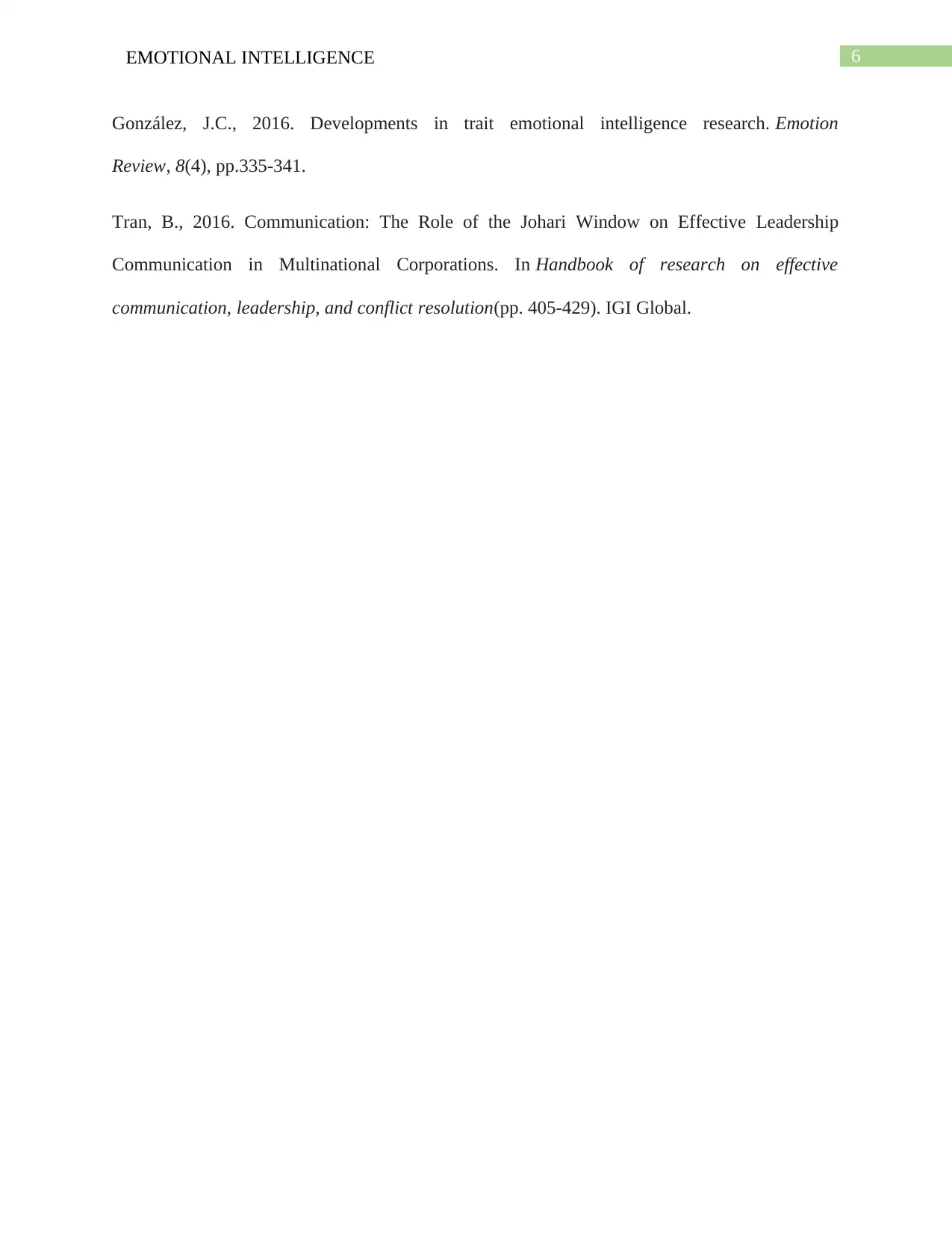
6EMOTIONAL INTELLIGENCE
González, J.C., 2016. Developments in trait emotional intelligence research. Emotion
Review, 8(4), pp.335-341.
Tran, B., 2016. Communication: The Role of the Johari Window on Effective Leadership
Communication in Multinational Corporations. In Handbook of research on effective
communication, leadership, and conflict resolution(pp. 405-429). IGI Global.
González, J.C., 2016. Developments in trait emotional intelligence research. Emotion
Review, 8(4), pp.335-341.
Tran, B., 2016. Communication: The Role of the Johari Window on Effective Leadership
Communication in Multinational Corporations. In Handbook of research on effective
communication, leadership, and conflict resolution(pp. 405-429). IGI Global.
1 out of 7
Related Documents
Your All-in-One AI-Powered Toolkit for Academic Success.
+13062052269
info@desklib.com
Available 24*7 on WhatsApp / Email
![[object Object]](/_next/static/media/star-bottom.7253800d.svg)
Unlock your academic potential
Copyright © 2020–2025 A2Z Services. All Rights Reserved. Developed and managed by ZUCOL.





